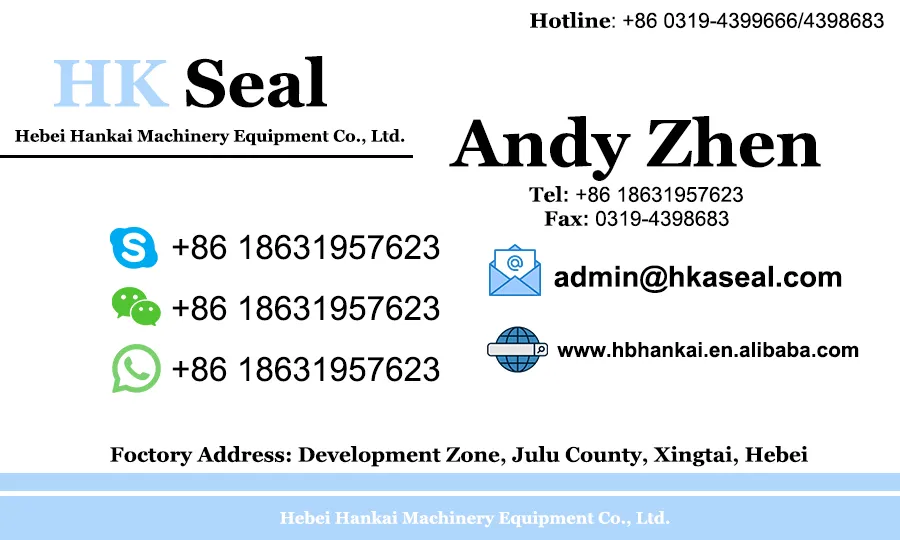Dec . 05, 2024 09:05 Back to list
Motor Oil Seal Specifications and Selection Guide for Optimal Performance
The Importance of Oil Seals for Motors
Oil seals, also known as radial shaft seals, play a crucial role in the operation and longevity of motors in various applications. These simple yet essential components are designed to prevent the leakage of lubrication and ingress of contaminants, ensuring optimum performance and reliability. In this article, we will delve into the types of oil seals, their materials, and best practices for maintenance to help you understand why they are critical for motor efficiency.
Understanding Oil Seals
An oil seal consists of a flexible, elastic material that compresses against the shaft, forming a barrier to contain the lubricant within the motor's bearings and other critical areas. The main function of an oil seal is to minimize fluid leakage while preventing dust, dirt, water, and other contaminants from entering the system. This is particularly important in environments where motors are exposed to harsh conditions, such as heavy machinery, automotive applications, and industrial settings.
Types of Oil Seals
There are several types of oil seals, each designed to accommodate specific needs
1. Single Lip Seals These are the most common type of oil seals. They feature a single sealing lip that makes contact with the shaft. They are typically used in less demanding environments where the risk of contamination is lower.
2. Double Lip Seals These provide enhanced protection with two lip seals, allowing for better retention of lubrication and improved defense against contaminants. They are ideal for more challenging applications.
3. Spring-Loaded Seals Some oil seals incorporate a spring to apply constant pressure against the shaft, ensuring a tighter seal. This is particularly useful in high-speed applications where centrifugal forces can compromise sealing efficiency.
4. Custom Seals For specialized applications, custom oil seals can be designed to meet specific dimensional and material requirements.
Materials Used in Oil Seals
The choice of material for oil seals is vital in determining their effectiveness and durability
. Common materials include- Nitrile Rubber (NBR) Widely used due to its good resistance to oil, fuel, and heat. Nitrile seals are versatile and suitable for various applications.
oil seal for motor

- Fluoroelastomer (FKM) Known for its exceptional resistance to high temperatures and aggressive chemicals, FKM is often used in applications where standard rubber cannot perform.
- Polyurethane Offers excellent wear resistance and is suitable for environments subjected to abrasive materials.
- Silicone Provides high-temperature resistance and flexibility, making it ideal for high-performance applications.
Selecting the right material for an oil seal is crucial, as it directly impacts the seal's ability to perform under specific operating conditions.
Maintenance and Best Practices
To ensure the longevity and effectiveness of oil seals in motors, regular maintenance and inspection are essential. Here are some best practices
1. Regular Inspections Check for signs of oil leakage around the seal. A small amount of seepage can signal wear or damage that warrants attention.
2. Proper Installation Follow the manufacturer's guidelines during installation, as improper fitting can lead to premature failure.
3. Environment Monitoring Keep an eye on the operational environment. Exposure to extreme temperatures, chemicals, or particulate matter can accelerate wear and tear on oil seals.
4. Lubrication Management Ensure that the appropriate type and amount of lubricant is used. Too little lubrication can lead to increased friction, while too much can overwhelm the sealing capabilities.
5. Periodical Replacement Eventually, oil seals will wear out and need replacement. Adhering to a maintenance schedule that includes regular replacement can prevent unexpected failures.
Conclusion
Oil seals are a vital component of motor systems, ensuring the effective sealing of lubricants and protection from contaminants. By understanding their types, materials, and maintenance practices, engineers and technicians can significantly improve motor performance and reliability. Proactive management of oil seals can lead to enhanced efficiency, reduced downtime, and an overall increase in the lifespan of motor applications. Investing in quality oil seals and adhering to best practices will undoubtedly yield benefits in any motor-dependent industry.
-
TCN Oil Seal Metal Ring Reinforcement for Heavy Machinery
NewsJul.25,2025
-
Rotary Lip Seal Spring-Loaded Design for High-Speed Applications
NewsJul.25,2025
-
Hydraulic Cylinder Seals Polyurethane Material for High-Impact Jobs
NewsJul.25,2025
-
High Pressure Oil Seal Polyurethane Coating Wear Resistance
NewsJul.25,2025
-
Dust Proof Seal Double Lip Design for Construction Equipment
NewsJul.25,2025
-
Hub Seal Polyurethane Wear Resistance in Agricultural Vehicles
NewsJul.25,2025
-
The Trans-formative Journey of Wheel Hub Oil Seals
NewsJun.06,2025
Products categories
















